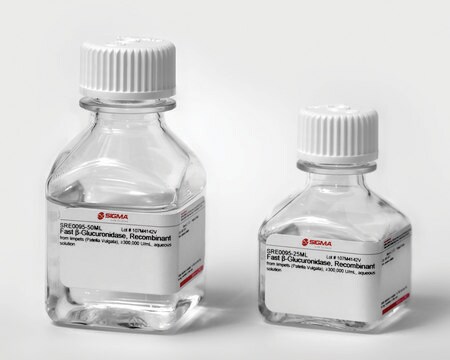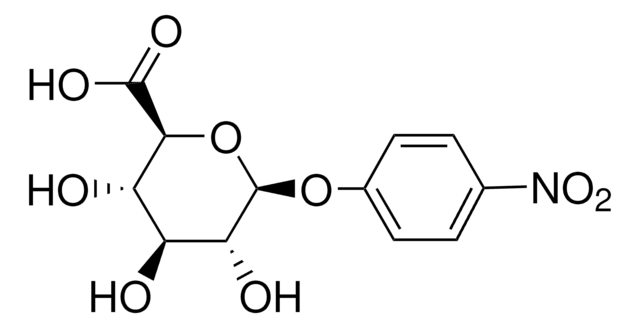G0799
β-Glucuronidase from Escherichia coli
>20,000,000 units/g protein, recombinant, expressed in E. coli, aqueous glycerol solution
Synonym(s):
β-D-Glucuronide glucuronosohydrolase
Sign Into View Organizational & Contract Pricing
All Photos(1)
About This Item
Recommended Products
recombinant
expressed in E. coli
Quality Level
form
aqueous glycerol solution
specific activity
>20,000,000 units/g protein
mol wt
74 kDa
concentration
>1 mg/mL
shipped in
wet ice
storage temp.
−20°C
Looking for similar products? Visit Product Comparison Guide
General description
β-Glucuronidase is a tetramer belonging to the glycosidase family with a molecular weight of 29 kDa. It is composed of 74 kDa identical monomers. The pI and optimal pH of the enzyme is 4.8 and 6-7 respectively.
Application
β-Glucuronidase was used in the study of Cer-β-glucuronide synthesis and evaluation of β-glucuronidase(s) from Escherichia coli or intestinal segments to release the head group.
New Technical Article Comparing Performance of Different Enzymes
Learn more
about recent application data generated by Sigma R&D to optimize hydrolysis for different drug classes using enzymes from different sources and the use of a chromatographicaly purified enzyme to reduce the effect of esterase activity resulting in conversion of 6-MAM to Morphine
Learn more
about recent application data generated by Sigma R&D to optimize hydrolysis for different drug classes using enzymes from different sources and the use of a chromatographicaly purified enzyme to reduce the effect of esterase activity resulting in conversion of 6-MAM to Morphine
Effective in the hydrolysis of steroid glucuronides.
Used for the hydrolysis of glucuronide conjugates in urinary metabolite analysis
Unit Definition
One Sigma or modified Fishman unit will liberate 1.0 μg of phenolphthalein from phenolphthalein glucuronide per hr at 37 °C at the pH 6.8 (30 min assay).
Physical form
β-glucuronidase is used as a reporter gene in GUS assays to monitor gene expression.
Highly purified solution in 50% glycerol
Signal Word
Danger
Hazard Statements
Precautionary Statements
Hazard Classifications
Resp. Sens. 1 - Skin Sens. 1
Storage Class Code
11 - Combustible Solids
WGK
WGK 3
Flash Point(F)
Not applicable
Flash Point(C)
Not applicable
Certificates of Analysis (COA)
Search for Certificates of Analysis (COA) by entering the products Lot/Batch Number. Lot and Batch Numbers can be found on a product’s label following the words ‘Lot’ or ‘Batch’.
Already Own This Product?
Find documentation for the products that you have recently purchased in the Document Library.
Customers Also Viewed
E M Schmelz et al.
Cancer research, 59(22), 5768-5772 (1999-12-03)
Dietary sphingolipids inhibit chemically induced colon cancer in mice. The most likely mediators of this effect are the metabolites ceramide (Cer) and sphingosine, which induce growth arrest and apoptosis in transformed cells. Sphingolipids are digested in both the upper and
D H Kim et al.
Biological & pharmaceutical bulletin, 18(9), 1184-1188 (1995-09-01)
beta-Glucuronidase was purified 360-fold from Escherichia coli HGU-3, an human intestinal bacterium. The specific activity of the purified enzyme was 17.78 units/mg protein. The enzyme (M.W. 290000) is composed of four subunits (M.W. 72000) with a pI and optimal pH
Xiaoyan Liu et al.
Zhejiang da xue xue bao. Yi xue ban = Journal of Zhejiang University. Medical sciences, 42(1), 67-74 (2013-03-19)
To construct a lentiviral RNA interference system targeting heparanase (HPSE) based on miR30 and to test its silencing effect. Three heparanase-shRNA structures were designed based miR30. The targeting fragments were obtained by PCR, then inserted into the vector LV PP-GFP
Fei Song et al.
Zeitschrift fur Naturforschung. C, Journal of biosciences, 67(11-12), 611-619 (2013-02-19)
Genes coding for avenin-like proteins (ALP) represent a new family of wheat storage protein genes. To find a wheat endosperm-specific promoter, a 1644-bp fragment upstream of the ALP type-B gene (GenBank accession number JN622144) was isolated. The important promoter elements
Regina Goetz et al.
Nature reviews. Molecular cell biology, 14(3), 166-180 (2013-02-14)
Fibroblast growth factors (FGFs) mediate a broad range of functions in both the developing and adult organism. The accumulated wealth of structural information on the FGF signalling pathway has begun to unveil the underlying molecular mechanisms that modulate this system
Our team of scientists has experience in all areas of research including Life Science, Material Science, Chemical Synthesis, Chromatography, Analytical and many others.
Contact Technical Service







